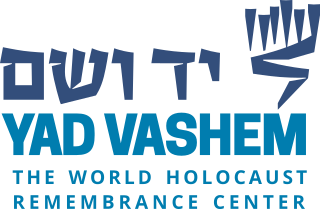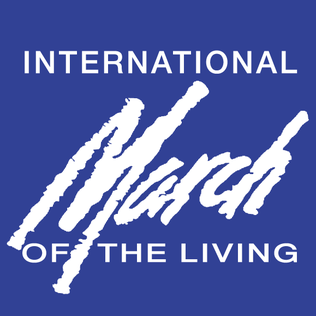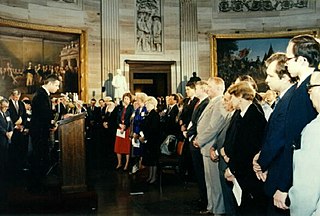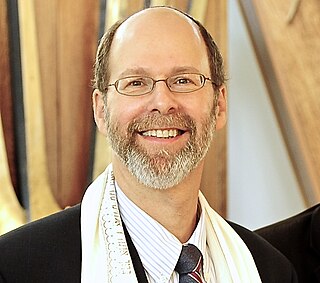Related Research Articles
April is the fourth month of the year in the Gregorian and Julian calendars. Its length is 30 days.
A United Nations General Assembly resolution is a decision or declaration voted on by all member states of the United Nations in the General Assembly.

Yad Vashem is Israel's official memorial to the victims of the Holocaust. It is dedicated to preserving the memory of the Jews who were murdered; echoing the stories of the survivors; honoring Jews who fought against their Nazi oppressors and gentiles who selflessly aided Jews in need; and researching the phenomenon of the Holocaust in particular and genocide in general, with the aim of avoiding such events in the future. Yad Vashem's vision, as stated on its website, is: "To lead the documentation, research, education and commemoration of the Holocaust, and to convey the chronicles of this singular Jewish and human event to every person in Israel, to the Jewish people, and to every significant and relevant audience worldwide."

Yom HaZikaron laShoah ve-laG'vurah, known colloquially in Israel and abroad as Yom HaShoah and in English as Holocaust Remembrance Day, or Holocaust Day, is observed as Israel's day of commemoration for the approximately six million Jews murdered in the Holocaust by Nazi Germany and its collaborators, and for the Jewish resistance in that period. In Israel, it is a national memorial day. The first official commemorations took place in 1951, and the observance of the day was anchored in a law passed by the Knesset in 1959. It is held on the 27th of Nisan, unless the 27th would be adjacent to the Jewish Sabbath, in which case the date is shifted by a day.

The United States Holocaust Memorial Museum (USHMM) is the United States' official memorial to the Holocaust. Adjacent to the National Mall in Washington, D.C., the USHMM provides for the documentation, study, and interpretation of Holocaust history. It is dedicated to helping leaders and citizens of the world confront hatred, prevent genocide, promote human dignity, and strengthen democracy.

Holocaust Memorial Day is a national commemoration day in the United Kingdom dedicated to the remembrance of the Jews and others who suffered in the Holocaust, under Nazi persecution. It was first held in January 2001 and has been on the same date every year since. The chosen date is the anniversary of the liberation of Auschwitz concentration camp by the Soviet Union in 1945, the date also chosen for the International Holocaust Remembrance Day and some other national Holocaust Memorial Days.
A Holocaust memorial day or Holocaust remembrance day is an annual observance to commemorate the victims of the Holocaust, the genocide of six million Jews and of millions of other Holocaust victims by Nazi Germany and its collaborators. Many countries, primarily in Europe, have designated national dates of commemoration. In 2005, the United Nations instituted an international observance, International Holocaust Remembrance Day.

Petr Ginz was a Czechoslovak boy of partial Jewish background who was deported to the Theresienstadt Ghetto during the Holocaust. He was murdered at the age of sixteen when he was transferred to Auschwitz concentration camp and gassed to death upon arrival. His diary was published after his death.

The March of the Living is an annual educational program which brings students from around the world to Poland, where they explore the remnants of the Holocaust. On Holocaust Memorial Day observed in the Jewish calendar, thousands of participants march silently from Auschwitz to Birkenau.

The International Holocaust Remembrance Day, or the International Day in Memory of the Victims of the Holocaust, is an international memorial day on 27 January that commemorates the victims of the Holocaust, which resulted in the genocide of one third of the Jewish people, along with countless members of other minorities by Nazi Germany between 1933 and 1945, an attempt to implement its "final solution" to the Jewish question. 27 January was chosen to commemorate the date when the Auschwitz concentration camp was liberated by the Red Army in 1945.

The World Day of Remembrance for Road Traffic Victims takes place on the third Sunday in November every year as the appropriate acknowledgment of victims of road traffic crashes and their families. It was started by the British road crash victim charity, RoadPeace, in 1993 and was adopted by the United Nations General Assembly in 2005.

The International Day for the Remembrance of the Slave Trade and its Abolition is an international day celebrated August 23 of each year, the day designated by UNESCO to memorialize the transatlantic slave trade.
United Nations General Assembly resolution 60/7 on Holocaust remembrance called for the establishment of a programme of outreach on the subject of the "Holocaust and the United Nations" and measures to mobilize civil society for Holocaust remembrance and education, in order to help to prevent future acts of genocide. Since its establishment by the Department of Public Information in January 2006, the Holocaust and the United Nations Outreach Programme has developed an international network of civil society groups and a multi-faceted programme that includes: innovative online educational products, youth outreach, DVDs, seminars and training programmes, a film series, book signings, a permanent exhibit at United Nations Headquarters in New York City, and the annual worldwide observance of the International Day of Commemoration in memory of the victims of the Holocaust.
The World Holocaust Forum is a series of events aimed at preserving the memory of the Holocaust. It is also known as the "Let My People Live!" Forum.

The Days of Remembrance of the Victims of the Holocaust (DRVH) is an annual eight-day period designated by the United States Congress for civic commemorations and special educational programs that help citizens remember and draw lessons from the Holocaust. The annual DRVH period normally begins on the Sunday before the Israeli observance of Yom HaShoah, Holocaust Memorial Day, and continues through the following Sunday, usually in April or May. A National Civic Commemoration is held in Washington, D.C., with state, city, and local ceremonies and programs held in most of the fifty states, and on U.S. military ships and stations around the world. The United States Holocaust Memorial Museum designates a theme for each year's programs, and provides materials to help support remembrance efforts.
Memorialization generally refers to the process of preserving memories of people or events. It can be a form of address or petition, or a ceremony of remembrance or commemoration.
Genocide Remembrance Day may refer to:
Jona Laks is an Israeli Holocaust survivor who was subject to human experimentation by Josef Mengele at the Auschwitz concentration camp. After the war, she founded and served as chairwoman of the Organization of the Mengele Twins. In January 2015, she addressed the United Nations General Assembly at its International Day of Commemoration in Memory of the Victims of the Holocaust Memorial Ceremony. She has been featured in several documentary films.

Eli Rubenstein is a Holocaust educator, writer, and filmmaker. He is currently the religious leader of Congregation Habonim Toronto, a Toronto synagogue founded by Holocaust survivors.
The People's Socialist Republic of Albania joined the United Nations on 14 December 1955, and has participated in several UN peacekeeping operations. The current Representative of Albania in the UN is Mr. Ferit Hoxha. Albania is a non-permanent member of the 15-country UN Security Council for the two-year term (2022–2023).
References
- 1 2 "UN marks Holocaust memorial day with exhibitions and pledges of 'never again'". 27 January 2011. Retrieved 11 March 2012.
- ↑ "United Nations to Honour Child Holocaust Victims by Screening 'The Last Flight of Petr Ginz' at Headquarters, 25 January". UN. Retrieved 11 March 2012.
- ↑ "2016 Calendar of Holocaust Remembrance Events".
- ↑ "Remarkable true story behind Helen Mirren's new film The Woman in Gold".